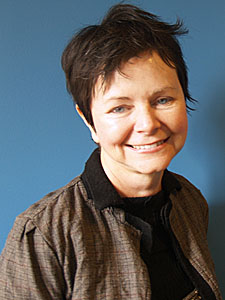Interview with Geraldine Brooks, author of 'People of the Book'
For those of you who have stepped by my blog in the last week, you might have seen my review of Geraldine Brook's book 'People of the Book. Now I can present a tiny interview, only 4 questions long, in which I asked her a couple of questions on her book and her writing. But first, a quick bio.
 Geraldine Brooks was born on the 14th of September, 1955, in Australia. She studied journalism at the University of Sydney and at the american Columbia niversity after getting a scholarship. In 1984 she married the American journalist Tony Horwitz and converted to his religion, Judaism. She became a foreign correspondent for the Wall Street Journal and covered crises in the Middle East, Africa. the Balkans and more. Her first book, 'Nine Parts of Desire', was published in 1994. Her book 'March' ,2005, won a Pulitzer Prize in 2006 and all her books have become bestsellers. Often they reflect on places she has been for her job as a foreign correspondent and their history. 'People of the Book' was published in 2008 and creates a history for the Sarajevo Haggadag.
Geraldine Brooks was born on the 14th of September, 1955, in Australia. She studied journalism at the University of Sydney and at the american Columbia niversity after getting a scholarship. In 1984 she married the American journalist Tony Horwitz and converted to his religion, Judaism. She became a foreign correspondent for the Wall Street Journal and covered crises in the Middle East, Africa. the Balkans and more. Her first book, 'Nine Parts of Desire', was published in 1994. Her book 'March' ,2005, won a Pulitzer Prize in 2006 and all her books have become bestsellers. Often they reflect on places she has been for her job as a foreign correspondent and their history. 'People of the Book' was published in 2008 and creates a history for the Sarajevo Haggadag.From your article on the Haggadah it can be concluded you did a huge amount of research. When did you start and how much of it did you eventually use to write the book?
GB: I always research and write simultaneously, letting the story I want to tell unfold to me what I need to know. Ther research was various: it included travel to Venice to get the feel for the ancient ghetto there, a return to sarajevo to interview people who had been involved in the real history of the Haggadah, and to watch a conservator as she worked on the codex, and visits to conservation labs at Harvard to see how conservation scientists investigate stains on parchment.
The Haggadah is obviously a fascinating book, but why and when did you decide to write a book about it?
GB: I was working as a reporter for the WSJ during the seige of Sarajevo. The book was thought to be missing then, and there was much speculation about its fate. That got me started.
Historical fiction can be very tricky because you never know how much liberty you can take in creating characters and events. Did you ever feel limited in what you could do and write?
GB: I try to stick as close to the line of known fact as I can, and when the historical record falls silent I try to bolste the work of imagination with as many shards of history and fact as are useful to the story without getting in the way of it.
For me one of the central themes of your book 'People of the Book' was the acceptance and respect of other religions. From your book I got the impression that especially Christianity was harsh on the Islam and Judaism. Was this something you wanted to express?
GB: It was inevitable that this would be a theme, given the history of the Haggadah and the people through whose hands it passed.
So, what did you think? Have you read the book? And if yes, what would you have asked her?



Thanks for sharing this interesting interview. I hope I get to read the book some day.
ReplyDeleteInteresting interview, I admire her as a writer. And you're right, you can really tell the amount of research she has done when you read the book.
ReplyDelete